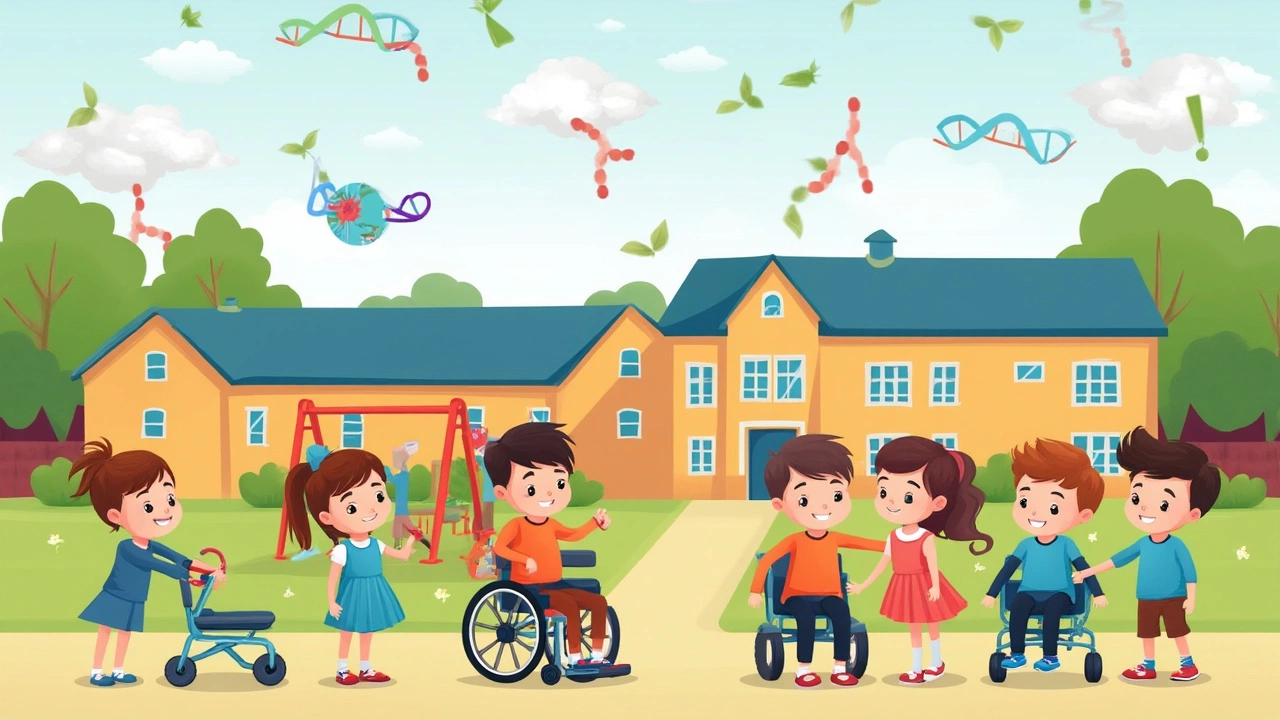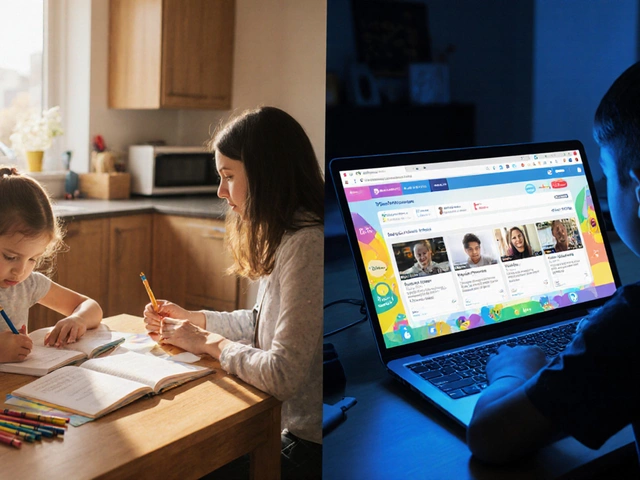There's a lot of confusion around why some kids need extra support. If you're like most parents, you want straight answers—no sugarcoating. The truth is, there isn't just one thing that causes a child to have special needs. It's a mix of factors, and they can look really different from family to family.
Some people still think special needs are always tied to genes or mistakes during pregnancy, but that's not the whole story. Sure, things like Down syndrome or cystic fibrosis come from genetics. But sometimes a tough birth, infections, or even something that happens after a child is born can change a child's development. Just last week, I met a dad at my kid’s soccer game who thought only older parents had kids with autism. Totally not true—age is just one tiny piece of a much bigger puzzle.
Every child is unique, which means their needs and the reasons behind them are too. If you’re feeling overwhelmed, you’re not alone. I’ve been there, searching endlessly online when something didn’t seem right with Augustine. What helped most was getting simple, direct info from people who actually live it—not just experts behind a desk.
- Overview: What Does 'Special Needs' Mean?
- The Main Causes—Not Just Genetics
- Misconceptions and Surprising Facts
- Steps Forward: What Helps Most
Overview: What Does 'Special Needs' Mean?
The phrase “special needs” gets thrown around a lot, but most folks don’t actually know what it covers. In simple terms, it refers to kids who need extra help or support in their daily lives—more than what’s typical for their age. This support could come in school, at home, or with medical care, and it can be short-term or last a lifetime. It’s not a medical diagnosis itself—think of it more as a big umbrella covering lots of different challenges.
Some common examples include autism, ADHD, Down syndrome, physical disabilities like cerebral palsy, and learning disabilities such as dyslexia. But it’s not just about what you can see on the outside. Kids with anxiety, speech delays, or sensory processing issues might look like everyone else, but they deal with daily hurdles that require real solutions.
The term also includes health conditions—like epilepsy or cystic fibrosis—that make life more complicated for kids and their families. Schools use the special needs label to help decide who gets things like extra time on tests, therapy, or classroom aides.
Special needs education is all about finding ways to help kids reach their full potential, even if the path looks different from the norm. The main goal? Level the playing field so these kids can learn and grow right alongside their peers.
If you ever hear someone assume only severe cases count as special needs, that’s a huge myth. Even mild learning issues can qualify if they affect a child’s ability to keep up in daily life. The key is figuring out exactly what support helps each individual kid—not just sticking on a one-size-fits-all label.
The Main Causes—Not Just Genetics
When you hear "special needs," most people jump straight to genetics. Yes, genes definitely play a role, especially with conditions like Down syndrome, fragile X syndrome, or cystic fibrosis. They're written into a child's DNA, and there's nothing anyone could have done differently to prevent those changes. But focusing only on genes skips a lot of the picture.
There are a bunch of causes that don’t come from genetics at all. Stuff can go sideways during pregnancy or birth. For example, if a baby doesn’t get enough oxygen during delivery, that can lead to cerebral palsy. Some infections like rubella or Zika during pregnancy are also known to affect a baby's brain or body.
Prematurity is another big one. Babies born way too early can have more learning or medical challenges, just because their organs didn’t have enough time to fully develop. The March of Dimes points out that preterm birth is one of the top reasons for lifelong disabilities in kids.
Then there’s the stuff that happens after birth. For example, trauma or a serious head injury can make a totally healthy baby suddenly need lots of extra help. Rare, but it happens. Even long, untreated illnesses or not getting enough of certain nutrients (like folic acid or iodine) while growing up can have long-term effects.
It’s also worth saying that sometimes the cause stays a mystery. Not every child with special needs gets a clear answer, even after endless tests. And honestly, that can be one of the hardest things for parents to handle.
- Special needs can start before birth, during delivery, shortly after, or even later.
- You can’t always “see” some causes—the changes might be hidden in the brain or genes.
- Home and community factors count: exposure to lead paint, bad infections, or extreme neglect can also shape how a child develops.
The bottom line: there’s rarely just one thing you can pinpoint. Sometimes it’s a combination of genetics, environment, and pure chance.

Misconceptions and Surprising Facts
If you hang around playgrounds, online forums, or even family dinners, you'll hear wild ideas about why kids have special needs. Let’s clear up some of the biggest ones right now, because half-truths just make things harder for everyone.
First off, having a child with special needs isn’t caused by bad parenting, and it’s definitely not contagious. You can’t "catch" autism, ADHD, or learning disabilities from another kid. That kind of thinking just adds guilt and shame where it doesn’t belong.
Another common myth? If a child looks healthy, they must not really have special needs. But a ton of kids with invisible challenges—like dyslexia or sensory processing issues—get overlooked because people expect to see something obvious. In reality, you can't spot most learning or developmental challenges just by looking at someone.
People also love to argue that screen time or junk food causes autism or ADHD. There’s zero solid science behind those claims. Kids had special needs long before TikTok and pizza rolls existed. Peer-reviewed research points much more to genetics, complicated brain differences, and sometimes, things that happen before or during birth.
- Moms who get sick during pregnancy sometimes worry it’s their fault. While certain infections or extreme stress can play a role, most of the time, it’s out of anyone’s control.
- Boys are diagnosed with some needs—like autism or ADHD—way more often than girls. For instance, boys are about four times as likely to get an autism diagnosis. But experts think girls are often just missed or misdiagnosed.
- The most common type of special needs in schools? Learning disabilities—like dyslexia—which affect about 1 in 5 kids, according to the National Center for Learning Disabilities.
| Condition | % of School-Age Kids Affected (US) |
|---|---|
| Learning Disabilities | 20% |
| ADHD | 9.8% |
| Autism Spectrum Disorder | 2.8% |
| Intellectual Disability | 1.2% |
Probably the most surprising fact? Tons of adults actually have undiagnosed special needs. Only when their own kids get evaluated do they realize some of their old school struggles finally make sense. So if something feels off, it’s never "too late" to get support—for your child or even yourself.
Steps Forward: What Helps Most
No matter the cause, every child with special needs deserves the right tools and support. The earlier you get started, the better. Research shows that early intervention—like speech or occupational therapy—can make a real difference in how well kids learn and handle daily life. In the U.S., kids can get evaluated for free through early childhood programs, and almost 69% of young kids with delays get at least one form of service before kindergarten.
Building a team is key. This usually means involving teachers, doctors, therapists, and sometimes social workers. But honestly, connecting with other parents has been just as valuable for me. They give advice you won’t find in any manual.
- Ask questions: Don’t be shy if something a professional says doesn’t make sense. Ask for plain-English answers.
- Create a plan: Schools work with parents to create an Individualized Education Program (IEP) if your child qualifies. This is a legal document that lays out what services your kid should get—and you have a real say in it.
- Keep records: Save notes from meetings, test results, and reports. This makes it easier to explain your child’s needs as they grow and situations change.
- Take care of yourself: The process can be draining. Find one thing that helps you recharge—even if it’s a five-minute walk or a chat with a friend.
Families with higher incomes or who live in big cities often have more access to therapy and specialists. Here’s a quick look at how access breaks down:
| Location | Access to Services (%) |
|---|---|
| Urban | 85 |
| Suburban | 73 |
| Rural | 44 |
It’s not fair, but being aware helps you push for more if you need it. If services are out of reach, many therapies now offer virtual or home-based options. Some insurance plans also cover more than you might expect, so always double-check what’s included.
Step by step, things get easier. The main thing is to never give up on fighting for your kid—and remember, you’re never doing it alone, even if it feels like it some days.






